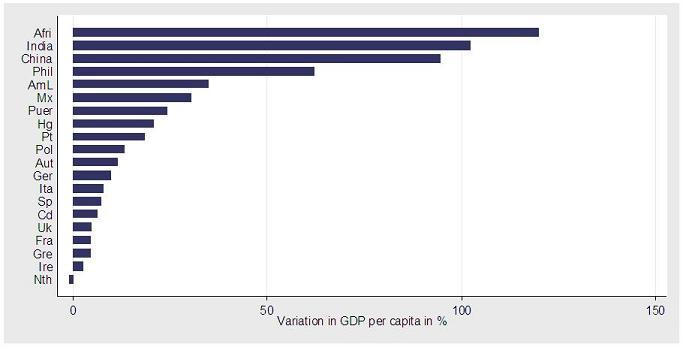What are the fundamental causes of differences in income per capita across countries? Although there is still little consensus on the answers to this question, it is often argued that social attitudes such as trust are one of the main determinants of economic development. As stressed by Kenneth Arrow:1 “Virtually every commercial transaction has within itself an element of trust, certainly any transaction conducted over a period of time. It can be plausibly argued that much of the economic backwardness in the world can be explained by the lack of mutual confidence.”
The intellectual tradition stressing the importance of social attitudes dates back to at least Max Weber, and has seen many recent restatements in political science in particular, recent ones being Robert Putnam2 and Fukuyama3. In his influential book Making Democracy Work, Robert Putnam showed, for instance, how civic attitudes and trust could account for differences in the economic and government performance between northern and southern Italy. This tradition has been so influential that it has led the World Bank to put on the top of the agenda the promotion of a new kind of capital stock to trigger economic development: the social capital. Following Fukuyama, this social capital can be defined as the “set of informal values or norms shared among members of a group that permits them to cooperate with one another”. Obviously the propensity to trust each other is likely to be key for fostering such mutual cooperation and growth.
But paradoxically, economists are still struggling for providing empirical evidence on such a causal impact of social attitudes on economic development. Most of the time, the economic literature has been successful to emphasise the existence of a cross-country correlation, instead of a causal relationship, between growth and social attitudes. For instance, Stephen Knack and Philip Keefer4, economists at the World Bank, proposed to measure the cross-country heterogeneity in social capital by using an international social survey, the World Values Survey, which reports direct information on the level of trust of people by asking them: “Generally speaking, would you say that most people can be trusted, or that you need to be very careful in dealing with people?”. This database is available since the early 1980’s.
The cross-country heterogeneity in the level of national trust is striking. The most trustful countries are the Scandinavian ones, where more than two-third of the inhabitants trust each other. The Anglo-Saxon countries come just next. In contrast, Mediterranean countries, such as Greece, Portugal or France, lag behind, where generally 20% of people are trusting. At the bottom stand developing countries, with no more than 10% of trusting people in African countries or Arabic countries. Knack and Keefer then showed a strong cross-country correlation pattern between country levels of trust and country levels of income per capita.
Yet this correlation pattern leaves completely unexplained the relation of causality between trust and growth and may result in misguided policy recommendations. Individuals who are living in wealthy countries, with efficient institutions, are likely to be more trusting people than individuals living in developing countries at war. The relation between trust and growth could thus go the other way around, in which case a prerequisite to strengthen social cooperation is to foster economic development first.
What do economists need to uncover a causal relationship running from social attitudes towards economic development? They basically need to find social attitudes that are not over-determined by economic development. A priori, this is a difficult task to the extent that social attitudes can always been influenced by the economic and social environment where people live. These difficulties show up even in the most complete and remarkable pieces of work of Guido Tabellini5, who shows that the literacy rate and the political institutions in place over the past several centuries are correlated with trust at the end of the twentieth century, and could thus capture the current impact of trust on the income per capita across European regions in 2000. But since these historical variables are time-invariant, they could also pick up the more fundamental influence of specific time-invariant features such as legal origins, political institutions, and more generally historical and geographical factors. At the end of the day, the question whether it is trust or any other specific national feature which matters for explaining growth is thus still open.
Our paper proposes a new method to uncover the causal link between trust and economic development by using an epidemiological approach. Our empirical strategy is based on the estimation of the inherited part of social attitudes of second-generation Americans, used to evaluate the inherited social attitudes in the home countries. In the spirit of the epidemiological literature, we show that social attitudes of second-generation Americans are significantly influenced by the country of origin of their ancestors. This empirical result bears on the fact that part of the beliefs and values of individuals are passed on through generations independently of their institutional and economic environment. We thus have a variable which is highly correlated with current social attitudes in the home countries and could be used as a proxy for these attitudes.
Our approach might have many appealing features. First, inherited social attitudes of second-generation Americans are not over-determined by the current economic development in the home countries. But more importantly, inherited social attitudes also allow us to track back the dynamics of social attitudes in the home countries. We show that inherited trust of second-generation Americans heavily depends on the time of immigration of their ancestors. Parents of second-generation Americans who migrated at different periods have transmitted different social attitudes to their offspring. We look at the inherited trust of two separate cohorts of Americans: those who belonged to the working age population in the early 1950s and in the early 2000s. It turns out that the inherited trust of American has changed over time. And this variation in inherited trust perfectly tracks back the changes in the level of trust in the corresponding home countries.
By following this strategy, we find a significant impact of trust on income per capita for 30 countries over the period 1949-2003. The set of countries covers all the regions of the world, including European countries, North American countries, Asian countries and the African and Latin American continents. To illustrate the quantitative impact of social attitudes on GDP per capita, Figure 1 displays the change in GDP per capita in period 2000-2003 that countries would have experienced if the level of inherited trust in a given country had been the same as that prevailing in Sweden during that period. This Figure shows that GDP per capita in 2000 would have been increased by more than 100% in Africa and India if the level of inherited trust among the working age population had been the same as in Sweden by that time, controlling for initial level of GDP per capita in 1950 and for time-invariant national features such as institutions. Africa and poor countries such as India and China are obviously extreme cases. It is well documented that these developing countries are plagued by an important lack of interpersonal trust. But Figure 1 shows that inherited trust also has a non-negligible impact on GDP per capita in developed countries. European countries such as France or the United-Kingdom would increase their GDP by 5% if the level of inherited trust was the same as in Sweden. Moreover, this paper proposes to track back in an historical perspective the main channels through which trust could have influenced growth. We show that inherited trust has affected income per capita mainly through total-factor productivity and incentives to accumulate physical and human capital. And we document that the magnitude of such aggregate effects of trust is linked to strong positive social interaction effects between individuals prone to cooperation.
Figure 1 : Predicted variations in GDP per capita in period 2000-2003 if the level of inherited trust of people in working age were the same as in Sweden
Footnotes
1 Arrow, K., 1972, Gifts and Exchanges, Philosophy and Public Affairs, (1), 343-362.
2 Putnam, R., 1993, Making Democracy Work, Princeton University Press, Princeton, NJ.
3 Fukuyama, F., 1995, Trust: The Social Virtues and The Creation of Prosperity, Free Press.
4 Knack, S. and Keefer, P., 1997, Does social capital have a economic payoff, A cross-country comparison, Quarterly Economic Journal, (112), 1251-1288.
5 Tabellini, G., Culture and Institutions: Economic Development in the Regions of Europe, IGIER working paper n°292.




